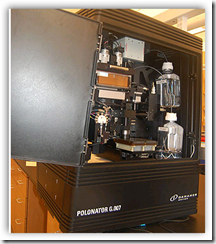This is the complete product. It is not the chip bases analysis offered by many genomics companies and it takes a while to compile. One thing about having the entire genome is that it is complete, where the chip  companies are updating data, software, etc., but that's not to say their services are not worthwhile as they will update the consumer when they become available, but $1000.00 compared to $350,000.00, well anyone can do that math.
companies are updating data, software, etc., but that's not to say their services are not worthwhile as they will update the consumer when they become available, but $1000.00 compared to $350,000.00, well anyone can do that math.
"Once you have your entire sequence sitting on your hard drive you can simply sit back and wait for new associations and techniques for assigning function, which will soon be appearing at an exponentially increasing rate as technology improves."
Recently when speaking with Dr. Milos from Helicos, I asked a similar question in essence, if you have the raw data, will interpretations vary? She said that is something that is discussed quite frequently and of course I don't think anyone is in a position to have an answer today, but the fact that it is already being discussed is a positive and indicates early down the road planning to hopefully aim towards some type of standards as the entire field grows. Helicos manufactures a machine offering single gene sequencing.
For individuals suffering with rare genetic diseases, this could really open the doors to a lot of uncovered information. This is not the first time covering Knome and George Cook, as he is also entered in the X-Prize worth 10 million to the winner for the first one to complete a 100% sequence in 10 days for $10,000.00. The machine is called the Polonator and actually they are for sale by now I  believe. You can read more about the Polonator here.
believe. You can read more about the Polonator here.
The Polonator for $150,000 was developed at the Church Laboratory of Harvard Medical School, the G.007. To read more about George Cook and some history, check out this story in "Wired". "For someone who has spent his whole career ahead of his time, he is suddenly very much a man of the moment."
When he started the work on the human genome project there were 10 volunteers from Harvard to have theirs created and one volunteer is John Halamka, CIO of Harvard Medical School and we read his blog here all the time from Beth Israel Hospital in Boston. He's everywhere. "Church cautions, however, that keeping clinicians and patients in the dark about specific genetic information — essentially pretending the data or the technology behind it don't exist — is a farce."In the not-too-distant future, Church says, hospitals and clinics could be outfitted with a genome sequencer much the way they now have x-ray machines or microscopes. " Once that happens you will never get the residents to go home on time.
At any rate, I hope this helps explain a bit of the difference between the processes of the total sequence and the chip offerings, so you can see it's an entirely longer and different process to get the whole thing, not to mention a few more dollars and there may be some variances with the personal genomics companies on exactly what they provide so check the sites and do some homework and ask questions and if you are in California, get your prescription from your doctor, that is if he has done his homework too. BD
As written earlier, there are some massive marketing efforts about to begin to bring physicians into the education loop. Move over Pharma here comes the biotech folks. BD
This little USB drive represents the current pinnacle of luxury personal genomics. It's the product of Knome (pronounced "know me"), a Cambridge, MA-based biotech start-up fronted by genomics pioneer George Church (recently profiled in Wired). In return for $350,000, Knome's customers receive a shiny 8 Gb drive containing their entire* genome sequence, along with specialized browser software for viewing it. $350,000 is a hell of a lot of money to fork over for a few gigabytes of data. So, how much of a return will these customers be getting on their substantial investment?
Customers receive their data at a "mini symposium dedicated to the recipient's genome, where scientists explain the results, the process behind them, and their limitations" - basically a genetics conference with themselves as the only subject.
Obtaining a complete genome sequence is certainly a massive technological leap beyond the offerings of the current crop of "budget" personal genomics companies, like 23andMe and deCODEme. These companies charge around $1000 for a chip-based analysis of up to a million sites of common variation scattered throughout your DNA, while Knome aims to provide the sequence of all three billion bases in your genome. In dollar-per-byte terms, Knome's customers are paying around 350 times more but receiving almost 3,000 times the information.
That means that a complete genome sequence will find many interesting variants that would be missed by a 23andMe-style scan; the problem is that rare disease-causing variants are also very poorly characterized by current studies, both because they are poorly tagged by chips, and because their low frequency makes it hard to find enough carriers to study.
Genetic Future : Is a personal genome sequence worth $350,000?
Related Story: The Incredible Men and their Gene Machines



0 comments :
Post a Comment